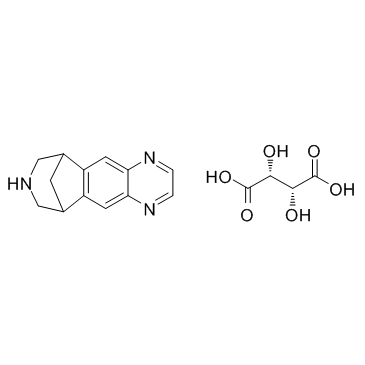Varenicline for treatment of alcohol dependence: a randomized, placebo-controlled trial.
Andrea de Bejczy, Elin Löf, Lisa Walther, Joar Guterstam, Anders Hammarberg, Gulber Asanovska, Johan Franck, Anders Isaksson, Bo Söderpalm
文献索引:Alcohol. Clin. Exp. Res. 39 , 2189-99, (2015)
全文:HTML全文
摘要
Alcohol dependence is a devastating illness affecting a large population, and new pharmacological treatments with good efficacy are greatly needed. One potential candidate is varenicline, a smoking cessation agent with partial agonist action at α4 β2 nicotinic acetylcholine receptors.A total of 160 subjects, 30 to 70 years of age, fulfilling DSM-IV criteria for alcohol dependence without any serious physical or mental disorders, were recruited through advertisement at 3 university clinics in Sweden during March 2009 to January 2011. After a 2-week placebo run-in period, subjects received 2 mg varenicline daily (titrated from 0.5 mg during first week) or placebo for 12 weeks in a double-blind manner.The primary outcome was the proportion of heavy drinking days, measured by self-reported alcohol consumption. Primary and secondary outcomes were calculated as a mean over the 10-week steady-state active treatment period. In the primary outcome analysis, no effect of varenicline over placebo was found (p = 0.73 for the intention to treat [ITT] and 0.92 for per protocol [PP]). Secondary outcome analysis found a significant reduction of specific alcohol marker phosphatidylethanol (PEth) in the blood in the varenicline group compared to placebo (p = 0.02 ITT). Craving (p = 0.048 PP) and Alcohol Use Disorders Identification Test (AUDIT) scores (p = 0.015 ITT) were also reduced in the active treatment group. PEth more strongly correlated with self-reported alcohol consumption than carbohydrate-deficient ttransferrin and γ-glutamyl transferase, and correlation coefficients were higher in the varenicline group than in the placebo group for all markers.Although the results of the main outcome of this study did not support an effect of varenicline in alcohol-dependent individuals, the secondary analyses of PEth, craving and AUDIT score support an effect of varenicline on alcohol consumption. The disclosure of a treatment effect and the lack of a clear placebo effect when using PEth as outcome variable, together with a nonsymmetric bias associated with self-reported data, strongly argue for using the specific biomarker PEth in studies of treatments of alcohol dependence.Copyright © 2015 by the Research Society on Alcoholism.
相关化合物
| 结构式 | 名称/CAS号 | 分子式 | 全部文献 |
|---|---|---|---|
 |
酒石酸伐伦克林
CAS:375815-87-5 |
C17H19N3O6 |
|
Concurrent access to nicotine and sucrose in rats.
2015-04-01 [Psychopharmacol. Ser. 232(8) , 1451-60, (2015)] |
|
Chronic treatment with varenicline changes expression of fou...
2015-12-01 [Neuropharmacology 99 , 142-55, (2015)] |
|
Effects of varenicline on ethanol-induced conditioned place ...
2014-12-01 [Alcohol. Clin. Exp. Res. 38(12) , 3033-42, (2015)] |
|
MiR-153 targets the nuclear factor-1 family and protects aga...
2014-01-01 [Biol. Open 3(8) , 741-58, (2014)] |
|
Comparison of the reinforcing properties of nicotine and cig...
[Neuropsychopharmacology 39(8) , 1843-51, (2014)] |